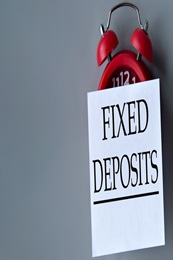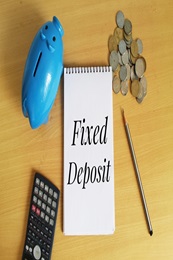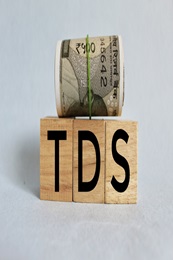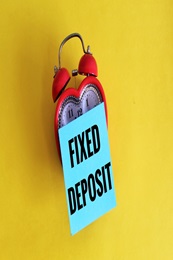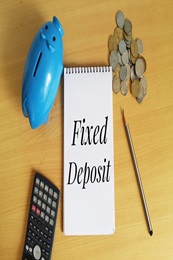How to Manage Your Fixed Deposits Efficiently
April 15, 2025
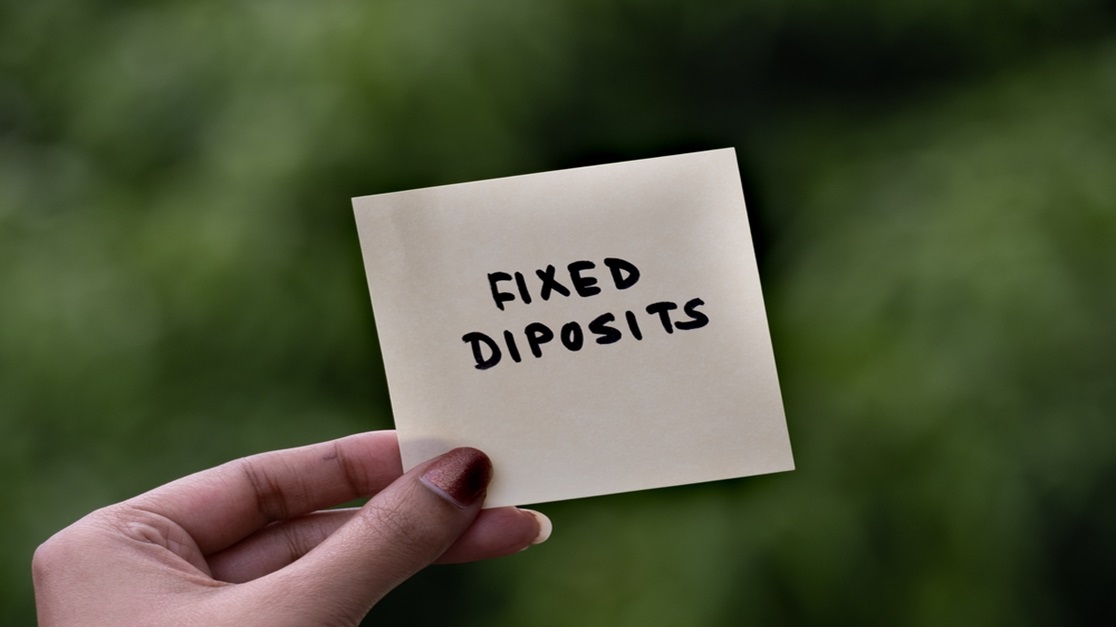
Managing your finances effectively is crucial to achieve your long-term financial goals. While a savings account may provide some growth, investing in other financial products can significantly enhance your savings.
One such product is a Fixed Deposit (FD), which allows you to earn steady returns on your investment while saving towards your dreams. In this article, we will discuss strategies to help you maximise returns and managing fixed deposits efficiently.
Best Tips to Manage Fixed Deposits
1. Choosing the Right Tenure
One of the key factors in managing fixed deposits is choosing the right tenure. The tenure refers to the duration for which you lock in your money in an FD. Generally, an FD tenure ranges from 7 days to 10 years. For non-callable FDs (FDs with lock-in period), the tenure could be slightly different. It is important to consider your financial goals when selecting a tenure.
For example, let's say you want to save up for a down payment on a house within the next two years. In this case, it would be prudent to choose a short-term FD with a one or two-year tenure. By doing so, you can ensure that your funds are readily available when you need them without having to break the FD prematurely.
On the other hand, if you are saving for retirement or have a long-term financial goal, opting for a longer tenure could be a wise decision. Longer tenures often offer higher interest rates, allowing your money to grow at a faster pace over time.
2. Fixed Deposit Laddering: A Strategic Approach
Fixed deposit laddering involves splitting your investment into multiple FDs with different tenures. This approach ensures that you have access to a portion of your funds at regular intervals while still benefiting from higher interest rates on longer-term deposits.
Suppose you have ₹1 lakh that you want to invest in FDs. Instead of putting the entire amount in a single FD, you can divide it into three different deposits: one with a one-year tenure, another with two years, and the last one with three years. This way, you create a ladder-like structure where each deposit matures at different intervals.
This strategy allows you to meet specific financial goals without having to break the entire FD prematurely. For example, if you need funds for a short-term goal after one year, you can access the amount from the first FD without affecting the other two deposits. This flexibility ensures that you maintain liquidity while optimising your returns.
3. Capitalising on Compounding Interest
When it comes to managing fixed deposits, one of the key benefits is the power of compounding interest. Compounding interest refers to earning interest not only on your initial investment but also on the accumulated interest over time.
To maximise your returns through compounding interest, consider reinvesting the interest and other earnings back into your FD. By doing so, you can accelerate your wealth accumulation and benefit from exponential growth.
Suppose you invest ₹1 lakh in an FD for five years at an annual interest rate of 7%. With simple interest calculation, you would earn ₹7,000 per year for five years, resulting in a total maturity amount of ₹1,35,000.
However, with compounding interest, the interest earned each year is added to the principal amount. This means that after the first year, your principal amount becomes ₹1,07,000 (₹1 lakh + ₹7,000). So, in the second year, you earn 7% interest on ₹1,07,000 instead of just ₹1 lakh. Over time, this compounding effect leads to a higher maturity amount.
Disclaimer: The above information is for illustration purposes only. Ujjivan SFB doesn't take any responsibility for the accuracy of the information. For latest interest rates, please click here.
4. Staying Informed and Timing Your Investments
Stay informed about market conditions and economic trends impacting FD interest rates. Interest rates fluctuate due to factors like inflation, government policies, and economic indicators.By monitoring these trends, you can time your investments to benefit from favourable rates.
For instance, if rates are expected to rise soon, consider investing in a longer-term FD to lock in a higher rate. Conversely, if rates are likely to fall, opting for shorter-term FDs or delaying your investment might be prudent.
Final Thoughts
Managing fixed deposits efficiently is crucial for achieving your financial goals. By choosing the right tenure, exploring fixed deposit laddering, capitalising on compounding interest, and staying informed about market conditions, you can make the most of your investments.
Looking to grow your savings? Ujjivan SFB offers a wide range of fixed deposit products. Select the FD of your choice and take a step forward to your financial goals. Alternatively, you can browse through Ujjivan SFB product suite - our wide range of financial products are designed to make your financial life better.
FAQs
1. Can I take a loan against my fixed deposit?
Yes, many banks offer loans or overdraft against fixed deposits. Loans against FD typically have lower interest rates compared to personal loans since they are secured by the fixed deposit.
2. Is the interest earned on fixed deposits taxable?
Yes, the interest earned on fixed deposits is taxable as per the income tax slab applicable to you. A minimum 10% TDS is applicable on the interest income, if the interest earned exceeds ₹40,000 (₹50,000 for senior citizens) in a financial year. Please note that this TDS exemption on FD interest is applicable for FY 2024-25 (till March 2025). For FY 2025-26, the current TDS exemption limit has been hiked to ₹50,000 for regular citizens and ₹1 lakh for senior citizens.
3. Can I withdraw my fixed deposit before the maturity date?
Yes, you can withdraw your fixed deposit before the maturity date; however, it may attract a penalty fee or result in lower interest earnings. Kindly note that Ujjivan SFB doesn't charge any premature withdrawal fee for withdrawals made after 6 months from the time of deposit.
4. Are fixed deposits safe?
Fixed deposits are considered safe investments as they are backed by the deposit insurance guarantee provided by the Deposit Insurance and Credit Guarantee Corporation (DICGC) for up to ₹5 lakh per depositor, per bank.
5. Can I choose to receive interest payouts at regular intervals instead of at maturity?
Yes, many banks offer the option to receive interest through monthly, quarterly, or annual payouts as per your preference.
6. Can I add more funds to an existing fixed deposit?
No, once an FD is opened, you cannot add more funds to it. However, you can open a new FD with additional funds.
7. What should I do if my fixed deposit matures and I don't need the money immediately?
You can reinvest the maturity amount in another FD or opt for a renewal of the existing FD at prevailing interest rates.
8. How do I choose the right tenure for my fixed deposit?
The right tenure depends on your financial goals. Shorter tenures are suitable for short-term goals, while longer tenures offer higher returns due to the compounding effect.
Latest Blogs

Telangana Housing Board & KPHB Colony: A Guide to Affordable Urban Housing in Hyderabad
March 14, 2025
As Telangana continues its rapid urbanisation journey, two key housing entities—Telangana Housing Board (THB) and Kukatpally Housing Board Colony (KPHB)—have played critical roles in shaping the state's real estate ecosystem.

Does Checking CIBIL Score Frequently Lower Your Credit Points?
April 07, 2025
Imagine you're planning to apply for a home loan, a credit card, or even a car loan. Naturally, you want to ensure your CIBIL score is in good shape before proceeding.

Explained: Can NRIs Buy an Agricultural Land in India?
April 03, 2025
Real estate investment is often a top priority for Non-Resident Indians (NRIs) looking to retain strong financial ties to India.

How to Improve Your CIBIL Score from 600 to 750: A Step-by-Step Guide
April 02, 2025
Your CIBIL score is like your financial reputation—banks check it before approving loans or credit cards. If your score is hovering around 600, you might face difficulties in securing credit or may get loans with higher interest rates.

What Happens When You Leave Your Savings Account Unused?
April 01, 2025
Imagine waking up one day to find that your hard-earned money is locked away and inaccessible. Sounds stressful, right? This is precisely what happens when you leave your Savings Account inactive for too long.

